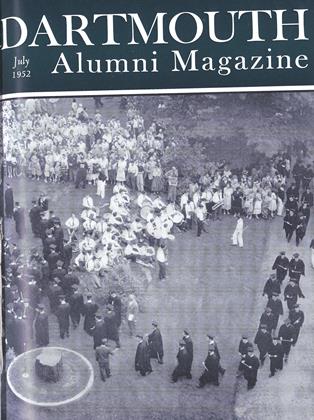by Prof. Harold R. Bruce. Henry Holt, NewYork, 1952; pp. xi, 836; $5.50.
The course in American government should still remain basic for every student in our American colleges today. Our leaders in public life and the general body of our citizenry have not shown such an extraordinary comprehension of the political system as to assure us that the course may be dispensed with. As the operation of government becomes necessarily more complex the need for greater political intelligence among college students increases. Professor Bruce provides a comprehensive text on the college level for the understanding of the governmental process. It is not overladen with endless detail, but the essentials are there. In addition, much can be said for the clarity of the exposition and the logical arrangement of the subject matter. While a very good chapter deals with the important subject of federal and state relationships the work deals almost exclusively with the national government. The charts, graphs, and tables show careful selection and are not likely to be passed over as so many spacefillers.
From the point of view of theory two criticisms might be offered. The first concerns Rousseau's influence on early American thought. It is highly questionable whether he should be bracketed with Montesquieu as a major influence on eighteenth-century Americans. Fortunately for us, his totalitarian democratic theory never caused us the difficulties that brought so many misfortunes to the French revolutionary movement. Secondly, the statement by Professor Bruce that "A state may choose to recognize certain limitations on its power, such as principles of morality, dictates of humanity, and natural law but these .. . may be altered or disavowed by it at any time" would seem to confuse what a state can do through physical power with what it may do by reason of moral limitations. Natural law, for instance, in democratic theory is beyond the competence of the state to abolish or abridge. Without this recognition there is no difference between totalitarian and democratic theory.
The book grows out of many fruitful years of experience in teaching the subject matter of American government. One can readily detect throughout the pages of the book Professor Bruce's own method of insistence upon a thorough grasp of the basic elements of American government to the exclusion of an accumulation of superfluous detail. It is a highly satisfactory piece of work.
 View Full Issue
View Full Issue
More From This Issue
-
 Article
ArticleThe Fifty-Year Address
July 1952 By E. BRADLEE WATSON '02 -
 Article
ArticleThe 1952 Commencement
July 1952 -
 Article
ArticleBaccalaureate Address
July 1952 By SIR OLIVER S. FRANKS -
 Article
ArticleDartmouth Awards Mine Honorary Degrees
July 1952 -
 Class Notes
Class NotesThe Big 25th for 1927
July 1952 By DOANE ARNOLD '27 -
 Class Notes
Class NotesA Glowing 190 7 Report
July 1952 By H. RICHARDSON LANE '07
Books
-
 Books
BooksFACULTY PUBLICATIONS
August 1942 -
 Books
BooksKINGDOM OF THE SPUR.
June 1953 By Cliff Jordan '45 -
 Books
BooksWEST-RUNNING BROOK
June 1929 By F. L. Childs -
 Books
BooksLOUIS SULLIVAN, PROPHET OF MODERN ARCHITECTURE
March 1936 By Francis E. Merrill '26 -
 Books
BooksALL THE BEST IN THE SOUTH PACIFIC.
June 1961 By JOHN HURD '21 -
 Books
BooksThe Principles of Sociology
May, 1924 By John M. Mecklin


